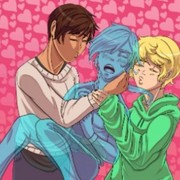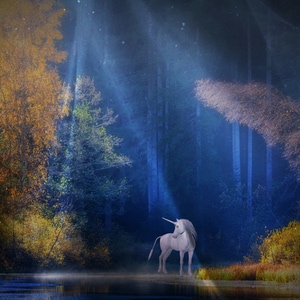John stared at the nightingale uncomprehendingly. He flinched as a black shape fled across his eyesight too fast to be spotted for sure but without a doubt the screech-owl he had heard earlier. All around, the light went out of the world.
“Janet,” he whispered again. The bird cocked its head.
But what enchantment was this? In the blink of an eye, the dell changed. John flinched again when he saw where he stood. The trees around them loomed bent, gnarled, and dead. Summer’s green grass was white and withered now. Above an ominous tangle of brambles at the top of the slope, a squat black tower blocked the sky. And below, a pale glimmer caught in the brambles—did he see right? Were they bones, with leathered and weathered scraps of flesh flying from them like flags?
John felt his hair lift his cap from his head. He took a deep breath to dive forward, to snatch up the little brown bird and run from the forest, but as in a nightmare, his body did not respond. He made as if to move again, and again he could not. He gasped for breath—no, he did not gasp for breath, not even his breast would shift so far.
He was fixed in place, a living statue, breadth of shoulder, depth of chest, bone and sinew, all of it useless, all of it so much earth… The nightingale spoke again, forlornly, and sprang up with a flutter of wings, as if to flee to him since he could not flee to her. But as she hung in the air, a dusky shape fell like a thunderbolt from the tangled branches above and caught the bird in its claws.
Not even a groan of sound escaped John’s throat. He could only stand and watch, helpless, as the owl rose on soft wings and soared toward the tower. There was a final cry from the nightingale. Then the owl and its prey were both swallowed up by the black and brooding shape of the castle.
Slowly all colour faded from the evening sky. John stood motionless in the dark. Inside the prison of his body he was yelling, inside he groaned and grunted and sweated against the enchantment holding him still. Outside he did not shift so much as a finger, twitch so much as a hair.
Slowly the moon rose. John ceased to fight; he rested in nightmare stillness and watched the moonlight paint the tower with light that should have been clean and costly but here seemed pale like a disease.
And he had not told her that he forgave her.
It was true that a hard choice now lay before him. But all the anger had gone out of him in a rush, leaving him weary and empty. “I forgive her, I forgive her,” he murmured inside his mind, over and again, like the words of a spell that might break him free.
At first, nothing happened. Then, as the moonlight waxed stronger, he saw something silver moving down a stair on the face of the tower wall. There must be a door up there. John watched and waited, and if his heart had beat at all it would have leapt with hope and fear with each step that brought her nearer.
It was Janet.
She came down the hill looking lovelier than ever with her hair shining like a mantle of silver. She had snatched off her coif and pinned gems on a silver chain about her head; she wore a stiff white farthingale of brocaded silk with silver threads running through it like water, and heavy flowing sleeves broidered with pale gold.
He knew that she was a mortal. But she looked like a fay-woman.
She stopped before him and folded her hands into her sleeves. Her eyes were thrown into shadow, so that John felt an unaccountable worry that they had been stolen. “Greet thee, Zachiel,” said Janet.
Zachiel?
“If the moon shines on the cage, Zachiel, let him loose at once.”
At once John could move, and he staggered forward to catch her into his arms, but that did no good either, for he crashed into some unseen barrier and rebounded ere ever he reached his love. As he recovered himself she tilted up her chin, and when the moonlight found her eyes, he knew she was not his love. The true Janet would never flash and fleer at him with so cold and bitter a triumph.
John gave a strangled cry and lunged forward again, this time reaching for her throat, but as before, some force threw him off. The thing that was Janet and yet not Janet laughed at him and backed a pace, watching with malicious eyes, savouring his despair.
“Give me back my love,” he cried hoarsely. “I conjure you, give me back my love!”
“You conjure me! By what power?” she asked in a voice that would be Janet’s, if it had not become slow and thick like honey in wintertime.
John’s mouth twisted. Once more he hurled himself upon the smiling wraith, and once more he could not come at her, and she stepped back with another laugh, dark-ringing like leaden bells.
It was hopeless. John threw himself down on his knees. “I beg you. Give her back. Give me back my Janet.”
The thing that was not Janet stood over him with a thin ecstatic smile like that of a saint in a glass window. “Yes. Beg. Put your mouth in the dust. Tell me you will do anything for me.”
“Take me instead. Let her go free.”
“More. Promise me more. Kingdoms, servants.”
“I have no more to give,” he whispered.
“No?” and her voice bubbled into another of those laughs. “No. I had forgotten. You are impoverished, like all mortals. Forget your Janet, fellow. She will tread the green earth no more in shoes of mortal make.”
The fay-woman turned away and went back up the path to the tower. John knelt on the ground until he heard the tower-door close behind her. Then he put up his sleeve to his face and rubbed away his tears. All he could hear was his own breath; he might be the only living thing in the dell. And only this morning Janet had run up to him in the street, reminding him they were to be married on Sunday.
What now? He was so helpless to touch the fay-Janet; would he even be able to touch the tower, let alone storm it by himself? In the end he climbed to his feet and turned back toward Middleton Dale. All that long way his mind seemed numb until a curious thought touched it… Was it, perhaps, a mercy that he had lost her? Had Heaven spared him the hard choice in putting Janet forever beyond his reach, as it had spared St Joseph in proving Mary forever clean and honest?
When he had put a little distance between himself and the dark tower he saw that the dead waste had given way to green summer, so that thick grass grew under his feet and a heavy canopy of leaves swallowed the moonlight above. Not much further on, long before he expected, he burst out of the wood and found himself at the top of the cliffside path.
There was music in the air. John glanced down at the village below, expecting to see lights and dancing, perhaps in celebration of Queen Mary’s accession. But the village slept soundly. He turned and looked behind, into the wood. There, as if they had sprung up that moment, were the fay-market lights; there the pipes wailed.
John took a ragged breath and plunged down the cliff-path.











Comments (0)
See all